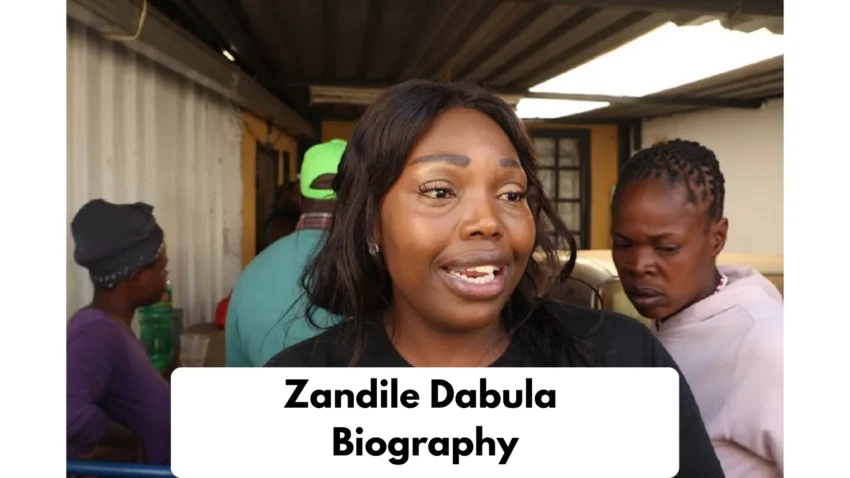Zandile Dabula is best known as the public leader of Operation Dudula, a high-profile South African civic movement that has campaigned aggressively against undocumented migration and pushed for prioritizing South African nationals in jobs, schooling and some public services.
Her leadership has made her one of the most visible — and controversial — activists in South Africa’s recent public debates on immigration and community safety.
Early life and background
Public records and mainstream press reporting show limited, publicly verified details about Dabula’s early life. In media interviews she has stated she was born and raised in Diepkloof, Soweto, and has repeatedly denied online claims that she is a foreign national. Because independent official records are not consistently available in the public domain, many biographical summaries rely on Dabula’s own statements and local reporting.
Career before activism
Before rising to public prominence, a number of online profiles describe Dabula as having worked in recruitment and human-resources-related fields, suggesting she had experience in community-level organising and workplace matters that later informed her activism. These accounts point to a transition from private-sector roles into civic activism as her public profile grew.
Rise to prominence — leading Operation Dudula
Operation Dudula began in Soweto and quickly expanded to other parts of the country. The movement, initially a community-based reaction to concerns about crime and perceived competition for jobs, evolved into an organised campaign that demands stricter enforcement of immigration laws and prioritisation of South African citizens for employment and social services. Under Dabula’s leadership, Operation Dudula has sharpened its national profile and shifted into coordinated actions aimed at institutions such as schools and clinics. Observers describe the organisation’s aims in terms of community self-help on one hand and exclusionary tactics on the other — a mix that has invited heated public debate.
Key campaigns and public positions
Dabula and Operation Dudula have focused on campaigns that include:
- Pressuring schools to prioritise South African children in enrollment and access to resources.
- Calling for immigration checks and restrictions in access to certain public facilities, and urging immigration enforcement at local level.
- Public marches and notices to local businesses and institutions believed to employ or service undocumented migrants.
These actions are presented by supporters as defending jobs and services for vulnerable South African communities; critics label some activities as xenophobic and potentially unlawful when they impede access to basic services.
Controversies and legal issues
Dabula’s leadership has attracted intense scrutiny and controversy. Political opponents and civil-society groups have accused Operation Dudula of promoting xenophobia and taking unlawful actions against migrants. In high-profile incidents, the Economic Freedom Fighters (EFF) and other parties have alleged involvement by Dudula members in events that had severe consequences for migrants — including claims tied to an infant’s death following a clinic blockade (these claims have been the subject of investigation and public dispute). The allegations led to formal complaints and high-profile media coverage, and Dabula and her movement have publicly denied culpability in the specific incidents flagged by critics.
Public perception — supporters and critics
Public opinion over Dabula and Operation Dudula is sharply polarised. Supporters — often from communities facing high unemployment and stretched public services — view the movement as a grassroots response to very real pressures on housing, jobs and local services. Critics, including human-rights organisations, civil-society leaders and some political parties, argue that the group’s tactics and rhetoric exacerbate xenophobia and can endanger foreign nationals, and they urge lawful, rights-respecting approaches to migration and social policy.
Personal life — what’s known (and what’s not)
Details about Dabula’s private life are limited in verified public sources. Like many active civic leaders, some personal details circulate online, but the most reliable public facts are those Dabula has stated herself in interviews and press statements — including her denial of claims that she is foreign-born and her assertion of being South African by birth and upbringing.
Impact and what’s next
Dabula’s leadership has pushed immigration and community safety issues higher on South African public and policy agendas. Whether Operation Dudula will be able to convert local activism into long-term political gains — or whether the movement will be reshaped by legal rulings, public opinion, or electoral politics — remains to be seen. For now, Dabula’s role ensures that debates about migration, social services and community-led enforcement remain centre-stage in many local conversations.
FAQs
Who is Zandile Dabula?
Zandile Dabula is the public leader of Operation Dudula, a South African civic movement focused on restricting undocumented migration and prioritising South African citizens in jobs and access to some public services.
Is Zandile Dabula South African?
Dabula has publicly stated she was born and raised in Diepkloof, Soweto, and has denied claims that she is a foreign national.
What is Operation Dudula?
Operation Dudula is a movement that started in Soweto and has campaigned around immigration, jobs and local services. It has been described in media and academic commentary as both a grassroots movement and — by critics — as adopting exclusionary tactics.
Has Dabula faced legal action?
Various allegations and investigations have been reported in the press (including accusations tied to incidents where members were alleged to have obstructed access to services). Some political parties have laid complaints; coverage and legal follow-up have been ongoing.
Conclusion
Zandile Dabula is a figure whose public profile captures the tensions in South Africa around unemployment, migration, and the role of community-led action.
Her leadership of Operation Dudula has made her a powerful and controversial voice: to some she is a defender of local livelihoods; to others she is a promoter of exclusionary and potentially unlawful tactics.
Because reporting and legal processes are ongoing, anyone researching Dabula or Operation Dudula should consult multiple reputable sources and follow current news to get the most up-to-date picture.
